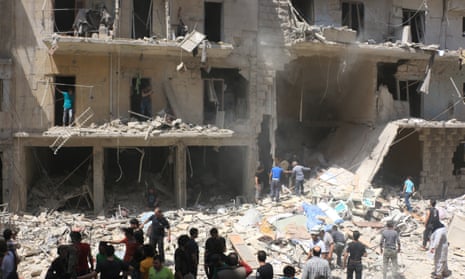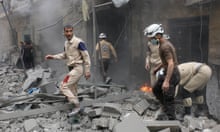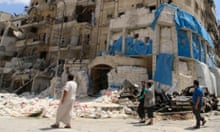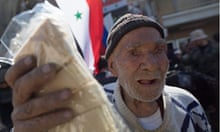Aleppo’s fate has always been at the heart of Syria’s war. The northern city was the biggest in the country, and its commercial hub, before fighting pounded whole neighbourhoods to rubble, and its streets and mosques are rich with historical and religious significance.
Rebel fighters infiltrated the eastern suburbs that are still a main stronghold nearly four years ago, and they have been battling the forces of President Bashar al-Assad for control ever since.
The fighting has always been intense because winning control of this city would be a major strategic and propaganda victory for either side.
Aleppo became infamous for the government’s use of barrel bombs to terrorise remaining civilians, and famous for the White Helmets[paywall], an unarmed rescue group who are among the few untarnished participants in a war that has spiralled into horrifying brutality.
The opposition was driven at first by the heady sense of possibility awakened by the Arab spring revolutions in nearby countries, and a conviction that in taking on Assad they had not just moral authority but the backing of America and its allies.
That was a tragic mistake, and has contributed to Aleppo’s destruction. While western leaders were eager to see Assad gone, they were not willing to make it happen.
Electorates in the west were disillusioned by the conflicts in Afghanistan and Iraq, and there was neither the will nor the money to match the support Assad would get from his allies, Iran and Russia.
“There was a dangerous rhetorical encouragement of the opposition that was never matched with the means to make it possible,” said Julien Barnes-Dacey, of the European Council on Foreign Relations.
“Since 2011 the west has been unprepared to match its stated ambition of regime change with the necessary means.
“Faced with the absolute commitment of Assad and his allies to remaining in power, regime change was always going to be dependent on politically unfeasible military intervention.”
In Aleppo, that mismatch played out in a long war of attrition that saw rebels expand their control, at one point laying siege to government-controlled areas, before Russian air support last year helped put government troops back on the offensive.
By February this year, the last reliable rebel route into the city was cut off, bringing fears that hundreds of thousands of residents who had hung on in Aleppo could be subjected to a starvation siege.
A ceasefire brought a temporary reprieve, but as the peace talks to which it was tied broke down, the horror has started up again.
Last week, for the first time since the war began, Friday prayers were cancelled across the city, and a doctor from Médecins Sans Frontières told the BBC that there might be as few as 40 doctors left in the city to care for a population of tens of thousands of civilians.
A new partial truce does not cover Aleppo: the government apparently regards it as too much of a prize to halt its advances, particularly as it has been signalling preparations for a new offensive for weeks.
Western countries have failed to find or nurture opposition groups that they find palatable enough to support, and are unwilling to back the fighters who are currently holding some ground against Assad, much less provide air support themselves.
But with funds and weapons still trickling through from other sources to an opposition with nothing left to lose, neither side is likely to claim a decisive victory any time soon.
That means another uneasy ceasefire might be the only way to halt the suffering of Aleppo’s remaining civilians, even if it must be forced on Syria’s factions by their backers.
“The question now is whether there is any space to revive this ceasefire, in terms of engaging the Russians and Assad, but also managing our own expectations with regard to the removal of Assad,” said Barnes-Dacey. “Any political approach geared at saving lives has to recognise the reality that his backers will not accept his departure.”









